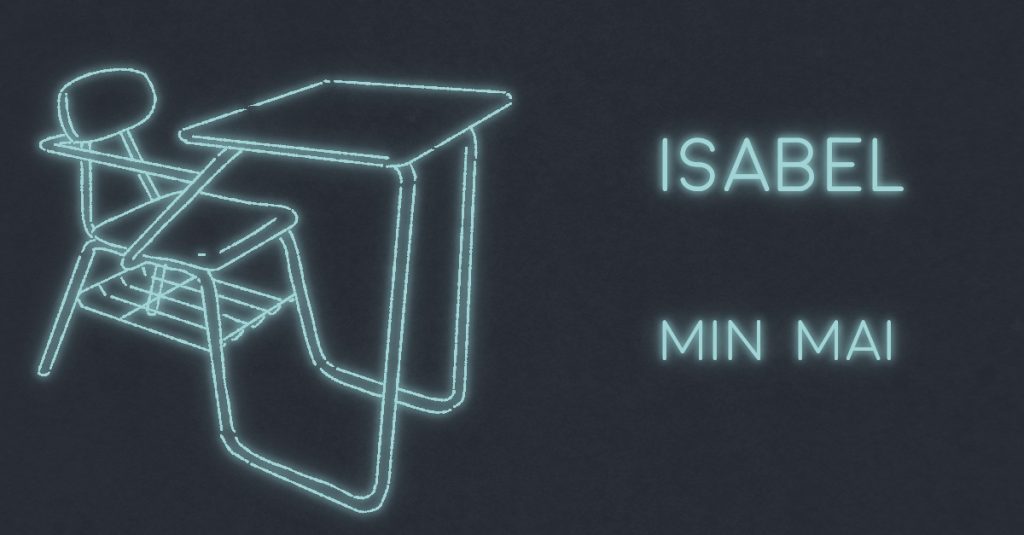Isabel was the first person I ever saw with unmarked skin. We cleaned classrooms together during the summer—the easiest way for us to earn money while maintaining the truth when we told our parents it was a school-sponsored extracurricular. We were scraping the gum off the underside of a desk when she removed her dress, folded it into a square, and rested it on the teacher’s desk. She said simply that she didn’t need the job of cleaning the gum off her clothes too. I stared at her sandy skin exhaling its own heat. I was sad for her: she was loveless.
#
My mother told me the only way to know someone was loved was by looking at their body. She never had to tell me that she loved me. It was clear by the deflated skin around her abdomen, the way her nipples pointed to the ground, the lingering hand on her back and thighs intended for me from my father. When she gave me my own marks with a belt or a hanger, I wore them proudly, knowing that I was loved more than anyone else in the world. I only began hiding the love after men in loose gray suits visited our home and she told me that no one else understood how some mothers loved their daughters. Then the marks on my limbs traveled to my back and ribs.
#
During the school year, Isabel was the teachers’ favorite. She excelled at every subject, effortlessly making everyone around her laugh with her jokes. I tried not to like her, but her kindness was a wave that caught everyone. After the men visited our home and I was told to hide the love, I wrapped myself with scarves in ninety-degree weather. She pulled me into the bathroom, the tiles wet with their own sweat, and pulled out a green concealer, applying it over the bruises on my neck. I learned to use green for my purple marks and purple for the yellow ones.
#
I had guessed from what Isabel wore that she was unloved: the tank tops that revealed the spotless skin on her arms and chest, the sheer shirts that whispered summer underneath, the skirts that rode up when she sat down. My suspicions were confirmed when we were both sitting on the sidewalk outside the school after all the students and teachers had gone. Behind us was a stone carving of an owl, our school mascot, with a key to the front door inside its beak that the principal had left us after the street lights turned on and she left to go home. We sat next to one another without saying anything. I watched her face perk up at each car’s headlight that shone through the darkness, the way it sunk once she didn’t recognize it. When my mother arrived, I climbed into the passenger seat and watched her become smaller and smaller.
#
Over the summer, as we lifted heavy desks and shelves, jutting our hips forward to rest the furniture on our bodies, I noticed marks beginning to appear on her hip bones. Purple circles developed on the apples of her hips and her face winced for a split second when the furniture pressed against it. Some days she wore yellow concealer, but it always smeared off in the combination of sweat and movement. When we patted the seats of the auditorium with brooms, dust exploded from the fabric and layered our skins like fallen clouds. We laughed that we wore every feeling she slung to the audience during performances: the anger she portrayed as Juror 3 filling the seams, the rage because her mother would rather spend two hours at the bar than at her play knotting the threads together. We decided that we needed to take a shower to wash off all the grime before we put our clothes back on. When I saw all of her untouched skin, for the first time in my life, I felt embarrassed for myself. It was more beautiful to be unloved.
#
When we finished cleaning, the new school year a few weeks away, we walked down the hallways, admiring the work: desks cleaned and set in rows, walls emptied of posters and notices waiting to be filled back up again, bathroom stalls polished of unspoken confessions. She asked me if the bruises on my body hurt the way hers did when she pressed on them. I told her that my mother explained the pain was a reminder of everything she had done to me—no, for me. Sweat was beading down my back, tickling my skin. Isabel told me love shouldn’t hurt. I told her she didn’t know what love was.
That night, we sat on the stage of the auditorium with the seats that were vacuumed of emotions watching us. She asked if she could show me painless love. I said only if I could show her mine. Her touch was gentle, soft like her skin, but when I bit into her breasts, I felt her chest press into my mouth. We performed on stage to no one, the markings on our bodies licked pink and red, beginning to understand real love.

